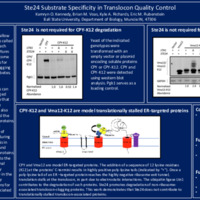Browse Exhibits (1 total)
Kamryn Kennedy | Ste24 Substrate Specificity in Translocon Quality Control

Translocons are molecular channels that allow proteins to cross membranes in a process called translocation. This enables proteins to reach their appropriate cellular locations to perform their specific functions. If translocons become clogged, they cannot be used as passages for other proteins. Unresolved translocon clogging may result in diseases, such as type 2 diabetes. There are two modes of translocation, posttranslational translocation (PTT) and cotranslational translocation (CTT). Errors can occur in both processes, resulting in clogged translocons. Ste24 is a conserved enzyme that degrades clogging proteins that enter the translocon via PTT. It is unknown if Ste24 also degrades proteins that use CTT. We tested the hypothesis that Ste24 degrades clogged proteins that undergo CTT, using a Saccharomyces cerevisiae model system. The abundance of proteins engineered to clog translocons during CTT was analyzed via western blot analysis in yeast containing or lacking STE24 . We found Ste24 does not promote degradation of proteins that undergo CTT. These data contribute to the knowledge of how cells maintain functional translocons, suggesting translocon quality control enzymes exhibit strong specificity in the types of translocon clogging proteins they degrade. Our results may have implications for understanding and treating diseases associated with translocon dysfunction.
Faculty Mentor: Eric Rubenstein
Department of Biology
Undergraduate
